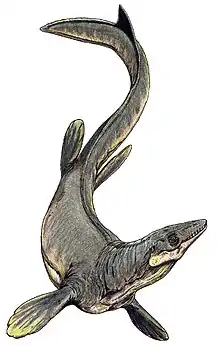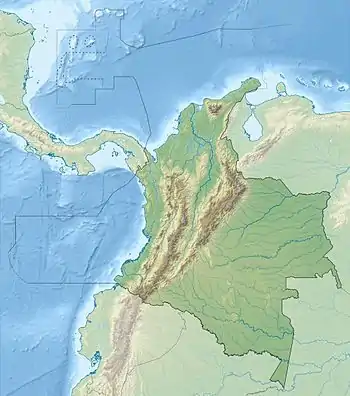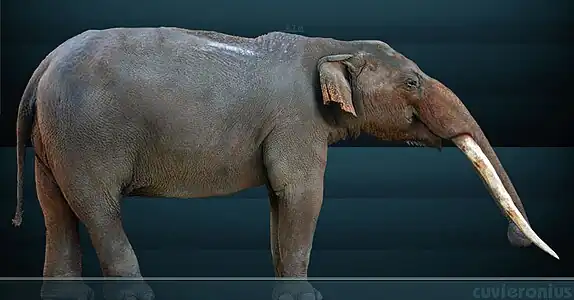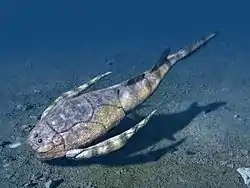Yaguarasaurus
Yaguarasaurus is an extinct genus of mosasauroid from the Late Cretaceous (Turonian) period of Colombia, South America. The remains discovered (an articulated skull, some vertebrae and ribs) were defined as a new genus and species of mosasaurid, Yaguarasaurus columbianus, by the Colombian paleontologist María Páramo, former director of the Museo de Geología José Royo y Gómez of INGEOMINAS in Bogotá. The first fossils remains of this animal suggested a cranial length of 47 centimetres (19 in) and a total length of 5 metres (16 ft); an additional skull that measures 87 centimetres (34 in) long implies a larger size.[1]
| Yaguarasaurus Temporal range: Turonian, | |
|---|---|
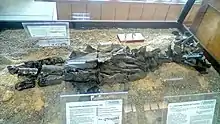 | |
| Skull and first cervical vertebrae of Yaguarasaurus. Geological Museum José Royo y Gómez, Bogotá | |
| Scientific classification | |
| Domain: | Eukaryota |
| Kingdom: | Animalia |
| Phylum: | Chordata |
| Class: | Reptilia |
| Order: | Squamata |
| Superfamily: | †Mosasauroidea |
| Family: | †Mosasauridae |
| Subfamily: | †Yaguarasaurinae |
| Genus: | †Yaguarasaurus Páramo 1994 |
| Type species | |
| †Yaguarasaurus columbianus Páramo 1994 | |
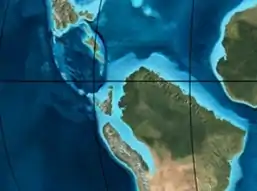
by Ron Blakey
This reptile is a member of the family of marine lizards Mosasauridae characteristic of Middle and Upper Cretaceous, with global distribution, but in South America known only through isolated remains (Price, 1957, Pierce and Welles, 1959 ; Bonaparte, 1978;[2] Ameghino, 1918). This mosasaur discovered in Yaguará, was at the moment of discovery the most complete material known in South America.[3]
Etymology
The remains were found in a limestone bed (Upper Turonian) of the La Frontera Formation, member of the Villeta Group, near Yaguará, Huila, in a site called Cueva Rica.[4] Its name means "Yaguará lizard of Colombia".
Phylogeny
In the initial descriptions of Yaguarasaurus, it was classified as a member of the subfamily Plioplatecarpinae;[1] the analysis of Polcyn and Bell (2005) showed that it was a distant relative of the advanced mosasaurids and were a close relative of Russellosaurus coheni and Tethysaurus nopscai, a group that could be a basal clade to the division between Tylosaurinae and Plioplatecarpinae subfamilies, called Russellosaurina.[5] After the discovery of the basal mosasauroid of Hungary Pannoniasaurus by Makádi et al. 2012 it became clear that Yaguarasaurus and the rest of the "russellosaurines" form a clade of basal amphibian mosasaurs related with the aigialosaurs, a grouping called the subfamily Tethysaurinae; the cladogram below follow the analysis of Makádi et al. de 2012:[6]
| Tethysaurinae |
| ||||||||||||||||||
Palci et al. (2013) describe a new Russellosaurine, Romeosaurus, and created subfamily Yaguarasaurinae, sister group of Tethysaurinae [7]
| Russellosaurina |
| ||||||||||||||||||
See also
References
- Páramo, M.E. (2000). "Yaguarasaurus columbianus (Reptilia, Mosasauridae), a primitive mosasaur from the Turonian (Upper Cretaceous) of Colombia". Historical Biology. 14 (1–2): 121–131. doi:10.1080/10292380009380560. S2CID 129466921. Retrieved 2017-03-30.
- Bonaparte, J. F. (1978). El Mesozoico de América del Sur y sus Tetrápodos. Vol. 26. Ministerio de Cultura y Educación Fundación Miguel Lillo, San Miguel de Tucumán, Opera Lilloana. pp. 1–596.
- Páramo, M.E. (1994). "Posición sistemática de un reptil marino con base en los restos fósiles encontrados en capas del Cretácico Superior en Yaguará (Huila)". Revista de la Academia Colombiana de Ciencias Exactas, Físicas y Naturales. 19 (72): 63–80.
- Yaguarasaurus columbianus at Fossilworks.org
- Polcyn, M. J.; Bell Jr., G. L. (2005). "Russellosaurus coheni n. gen., n. sp., a 92 million-year-old mosasaur from Texas (USA), and the definition of the parafamily Russellosaurina". Netherlands Journal of Geosciences. 84 (3): 321–333. doi:10.1017/s0016774600021107.
- Makádi, L. S.; Caldwell, M. W.; Ősi, A. (2012). Butler, Richard J (ed.). "The First Freshwater Mosasauroid (Upper Cretaceous, Hungary) and a New Clade of Basal Mosasauroids". PLOS ONE. 7 (12): e51781. Bibcode:2012PLoSO...751781M. doi:10.1371/journal.pone.0051781. PMC 3526648. PMID 23284766.
- Palci, A.; Caldwell, M. W.; Papazzoni, C. A. (2013). "A new genus and subfamily of mosasaurs from the Upper Cretaceous of northern Italy". Journal of Vertebrate Paleontology. 33 (3): 599. doi:10.1080/02724634.2013.731024. S2CID 86646993.
External links
- (in Spanish) Yaguarasaurus columbianus - Paleontología en Colombia
